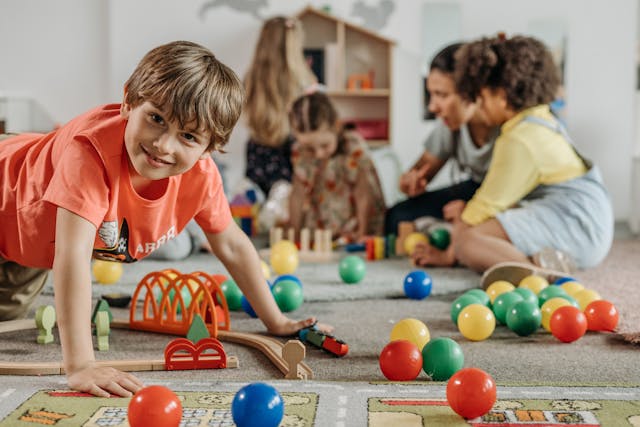Parents often worry about their child’s short attention span, especially in the early years when curiosity can quickly shift from one activity to another. In today’s fast-paced world, where distractions are everywhere, helping children develop focus has become more important than ever. A Montessori nursery in Dubai provides a unique approach to addressing this concern. By creating a carefully prepared environment and offering purposeful activities, Montessori education helps children strengthen their ability to concentrate while enjoying the process of learning.
Why Concentration Matters in Early Childhood
Concentration is the foundation of all learning. When children learn to focus on a task for a meaningful period, they absorb information more effectively, build problem-solving skills, and develop perseverance. Early years are the most critical time for nurturing this skill, as young children are forming habits and abilities that will shape their future academic and personal growth.
A lack of concentration can lead to difficulties in school, frustration during learning, and challenges in completing tasks. This is why Montessori nurseries place such a strong emphasis on guiding children toward focused engagement from the very beginning.
The Montessori Philosophy of Focus
Montessori education is built around the belief that children are naturally curious and eager to learn. Instead of forcing concentration through repetitive drills or external pressure, the Montessori approach allows children to focus because they are genuinely interested in what they are doing.
The philosophy emphasizes:
- Freedom of choice: Children select activities that capture their interest, making concentration more natural.
- Uninterrupted work cycles: Extended periods of time are provided so children can fully immerse themselves in tasks.
- Purposeful materials: Montessori tools are designed to spark curiosity and sustain engagement.
Through these principles, children learn to sustain focus not because they are told to, but because they are internally motivated.
The Prepared Environment: A Key to Focus
One of the most distinctive features of a Montessori nursery is its prepared environment. Every element of the classroom is designed to encourage independence, order, and concentration.
- Organized spaces: Materials are neatly arranged on shelves at a child’s eye level, inviting exploration without overwhelming them.
- Minimal distractions: Classrooms are calm and uncluttered, creating a peaceful atmosphere that supports focus.
- Age-appropriate tools: Activities are designed to match a child’s developmental stage, ensuring they are challenging yet achievable.
This structured environment makes it easier for children to engage deeply with tasks and sustain their attention over time.
Montessori Materials That Support Concentration
Montessori classrooms use specialized materials that are both hands-on and self-correcting. These are not just toys—they are learning tools that encourage children to explore concepts through active engagement.
- Practical life activities: Pouring water, sweeping, or buttoning clothes may seem simple, but they require careful attention and help children refine motor skills while focusing on a single task.
- Sensorial materials: Activities like sorting shapes, matching sounds, or grading colors train the senses and demand sustained concentration.
- Mathematical tools: Beads, rods, and number boards allow children to understand abstract concepts through tangible experiences, holding their attention for longer periods.
These materials are designed to capture interest while encouraging independent problem-solving, keeping children absorbed in the process.
The Role of Teachers in Fostering Concentration
In Montessori education, teachers act as guides rather than traditional instructors. They observe each child closely to understand their interests and learning style, then introduce activities that align with those preferences.
Instead of interrupting or directing constantly, teachers step back and allow children the time and space to focus. They create an atmosphere of calm encouragement, stepping in only when guidance is needed. This respectful approach gives children ownership of their learning, making concentration a natural outcome.
Developing Concentration Through Daily Routines
Montessori nurseries also emphasize the importance of daily routines, which provide consistency and security. When children know what to expect, they are better able to focus on activities without feeling rushed or distracted.
For example, the three-hour work cycle commonly used in Montessori classrooms gives children uninterrupted time to choose and complete tasks at their own pace. This routine gradually strengthens their ability to remain focused for longer stretches, preparing them for future academic settings.
The Connection Between Independence and Focus
Independence is central to the Montessori method, and it directly supports concentration. When children are trusted to choose their activities, manage their materials, and complete tasks on their own, they develop self-discipline. This autonomy fosters a sense of responsibility, which naturally leads to deeper engagement.
Simple acts like pouring their own drink or tidying up after play may seem small, but they require mindfulness and attention. Over time, these habits build concentration and confidence in their abilities.
Long-Term Benefits of Early Concentration
Children who develop strong concentration skills in their early years carry this ability into every stage of life. Some long-term benefits include:
- Academic success: The ability to focus helps children grasp complex subjects with ease.
- Problem-solving skills: Concentration allows children to think critically and persist through challenges.
- Emotional regulation: Focused activities help children manage emotions and build patience.
- Lifelong learning: Curiosity and concentration together create motivated, self-directed learners.
By fostering concentration early on, Montessori nurseries prepare children not only for school but for the many challenges and opportunities they will face in life.
Conclusion
In an age where distractions are constant, developing concentration in young children has never been more important. A Montessori nursery in Dubai provides the ideal environment for this growth, blending independence, purposeful materials, and uninterrupted routines to nurture focus naturally. By encouraging children to engage deeply with meaningful activities, Montessori education ensures that concentration becomes not just a skill, but a lifelong habit that supports success in every aspect of life.






Comments